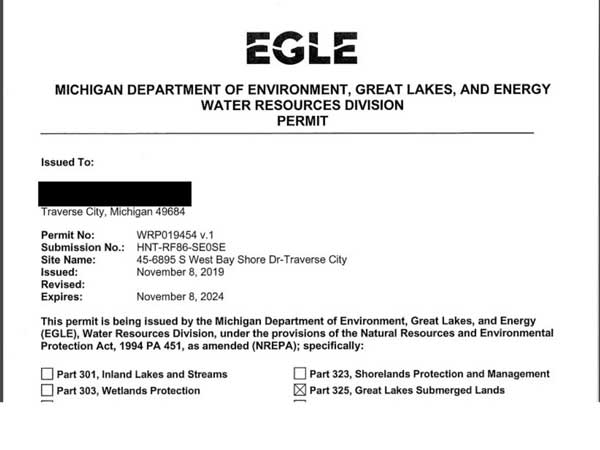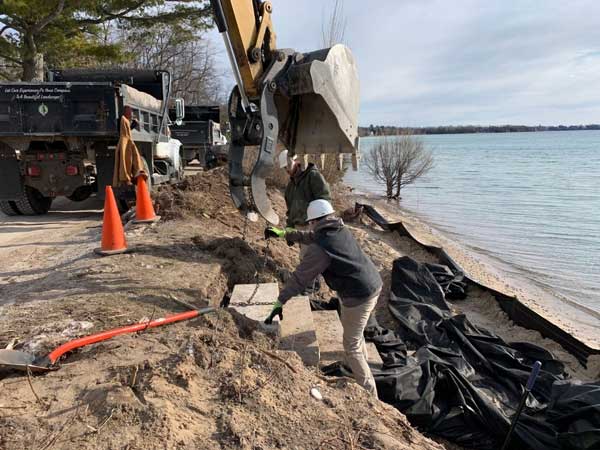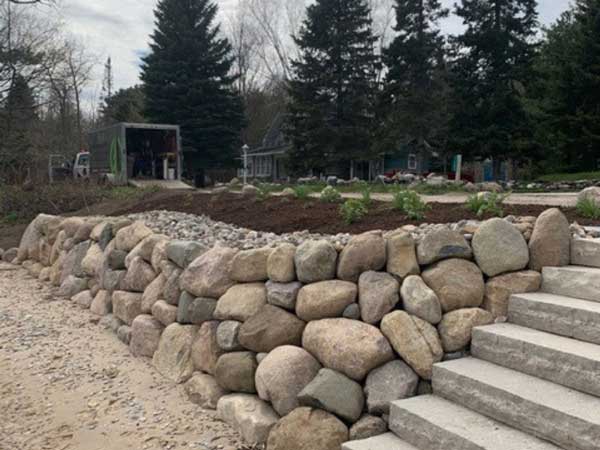When you build a home, you need permits from a variety of local entities, but did you know your landscape installation project needs permits pulled as well?
The permitting process can be confusing, frustrating, and can sometimes slow down or totally halt your landscape project if not tackled correctly. Because of the Great Lakes, additional permitting is required in Michigan to stabilize our shoreline.
So where do you even begin? Let’s dive in and discuss what permits your project may need, why you need them, and what happens if you choose not to pull permits.
Why does my project need a permit?
The purpose for really all landscaping permits is to protect the fresh water resources we have in Michigan.
If your home is located on the shoreline of our large lakes, like Lake Michigan, your property may be classified as a ‘critical dune’. These areas require additional permitting so that the shoreline can be protected, which has an enormous impact on our environment.
Permitting works from the top down. If your project needs state and federal permitting (EGLE permitting), this must be obtained first, before township or county will issue any permits. If you need a soil and erosion permit through the county, this must be obtained before your township will issue any of their permits.
To learn more about why shoreline restoration is so important, check out this blog.
State/Federal Permits
If your property is located on a critical dune, on the shores of Lake Michigan, near wetlands, or another major body of water, your project may need permitting through the Michigan Department of Environment, Great Lakes, and Energy (an EGLE permit). The EGLE permit is now a joint permit with the United States Army Corps of Engineers to eliminate additional permitting. To learn more about each of these groups and the permitting process they require check out these links: EGLE permitting and USACE permitting.
County Permits
Both Grand Traverse and Leelanau County require a Soil and Erosion Permit to do work on nearly any medium to large scale property. These permits are required to protect our beautiful area and the many bodies of water surrounding it.
Soil and Erosion Permit
Soil and Erosion permits are required if your property requires ‘excavating, filling, grading, building, etc’ and the site is:
- Within 500’ of any lake or stream
- Disturbing more than 1 acre
Grand Traverse County has additional regulations that require a permit in the following situations:
- Within 500 feet of regulated wetlands: Land characterized by the presence of water sufficient to support wetland vegetation (These are protected by Part 303, Wetland Protection of PA 451)
- Within 500 feet of a County Drain.
- Slopes of 20% or greater.
- Heavy clay soils: Commonly termed hardpan clay and soils classified in hydrologic group D in the Soil Survey
Leelanau County has additional regulations that require a permit in the following situations:
- All commercial projects
- Earthwork within 500 feet of a lake or stream (includes minor projects)
- Earthwork within 100 feet of a regulated wetland (includes minor projects)
- Construction of a driveway with a slope of 10% or greater
- Every project that will disturb one or more acres of soil
- Any work done in a subdivision and all projects in Leland and Solon townships need a permit, whether within 500′ of water or not
Township Permits
In addition to state and county level permits, many times the township permits can be the most tricky to navigate. Each township has the right to review landscape plans and require changes to be made according to the rules they have in place.
For example, Long Lake Township has specific regulations regarding how far a patio has to be set back from Long Lake. Peninsula township requires that they review any impervious surface that will be installed near the lakeshore(basically their own version of a soil and erosion permit called a land use permit—you still need the soil and erosion permit from the county though) and require plantings near the lakeshore to be native. To learn what native plantings are check out this link.
What if I don’t get a permit?
Regardless of whether you are a homeowner or a landscape contractor, you must pull permits to do large-scale landscaping work on your property, especially if you are located near a body of water.
Choosing not to get approval for your landscape work to be completed can result in hefty fines and potentially having to remove any landscaping that was installed without permitting. It can also be required that you pay to restore any damage done during the un-permitted work, and you can be refused a permit to do further work on your property after breaking the rules.
Selecting the Right Landscaping Company to Complete Your Project
While the permitting process is certainly an annoyance in both time and cost, it is not something you, as a homeowner, should have to worry about when you sign a contract with a landscape installation company.
At TruNorth Landscaping, we pull all the necessary permits to complete your work. For projects along the Lake Michigan shoreline, we coordinate with a variety of groups to be sure your project not only is meeting regulations but that your project will help support the beautiful shoreline.
As a homeowner, you may be unsure if your landscaping project needs a permit, but your landscape contractor should know what they are doing. The permitting process can be confusing and frustrating, so working with an expert can relieve some of the pressure you may feel around the process. Be sure to discuss with the company you select how they approach the permitting process.
Ready to get started on your landscaping project in Grand Traverse or Leelanau County, MI? If so, meet with our team of experts, choose a solution to improve your property, and get ready to sit back, relax, and enjoy your beautiful outdoor space.
Get started today with a consultation!
Want tips and tricks for your lawn & landscaping?
Sign Up For Our Free Quarterly Newsletter
We take your personal information very seriously. We will not share any of the information you provide with any 3rd parties. Provided information will be used specifically to contact you in regards to your inquiry.




